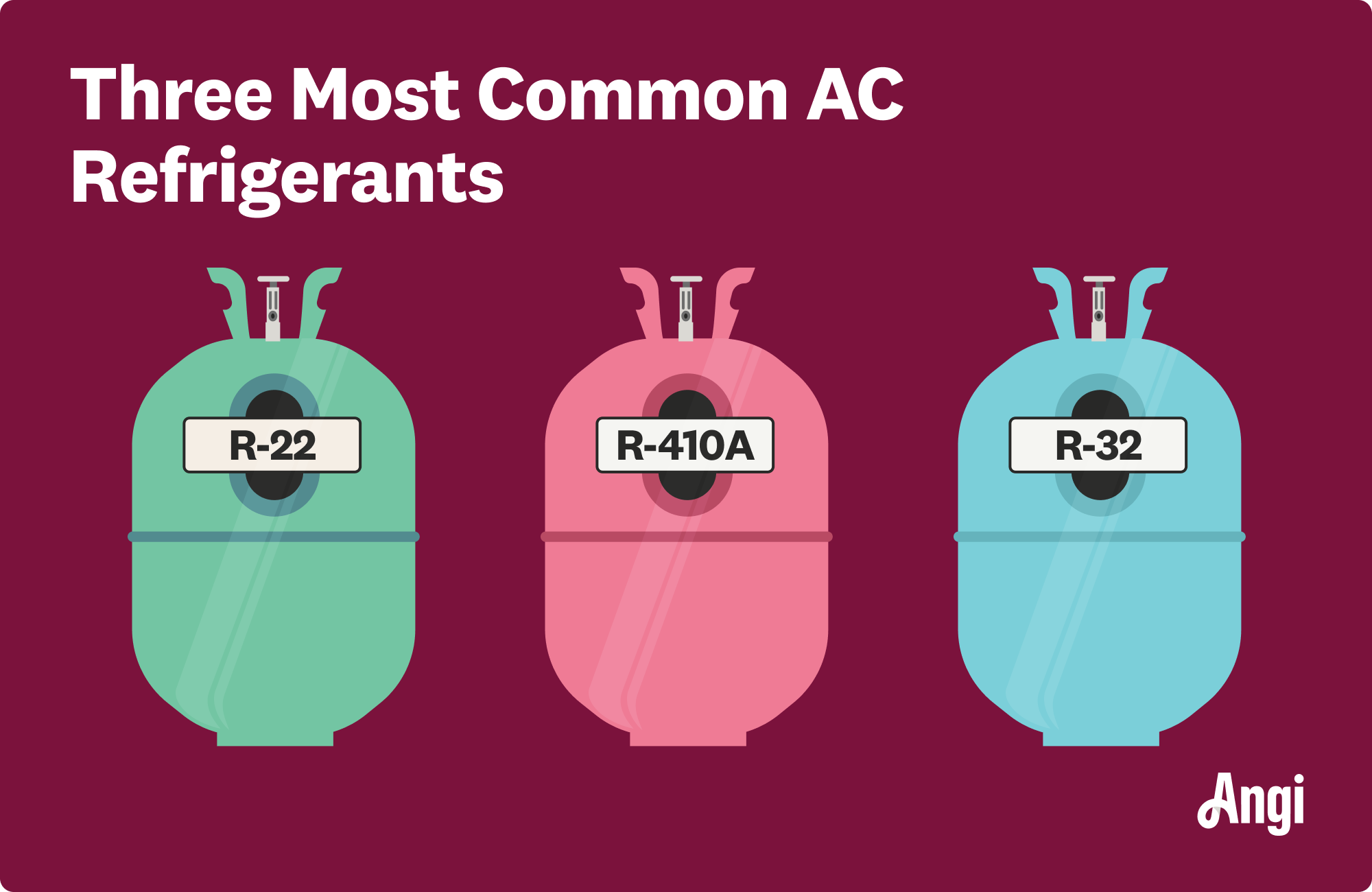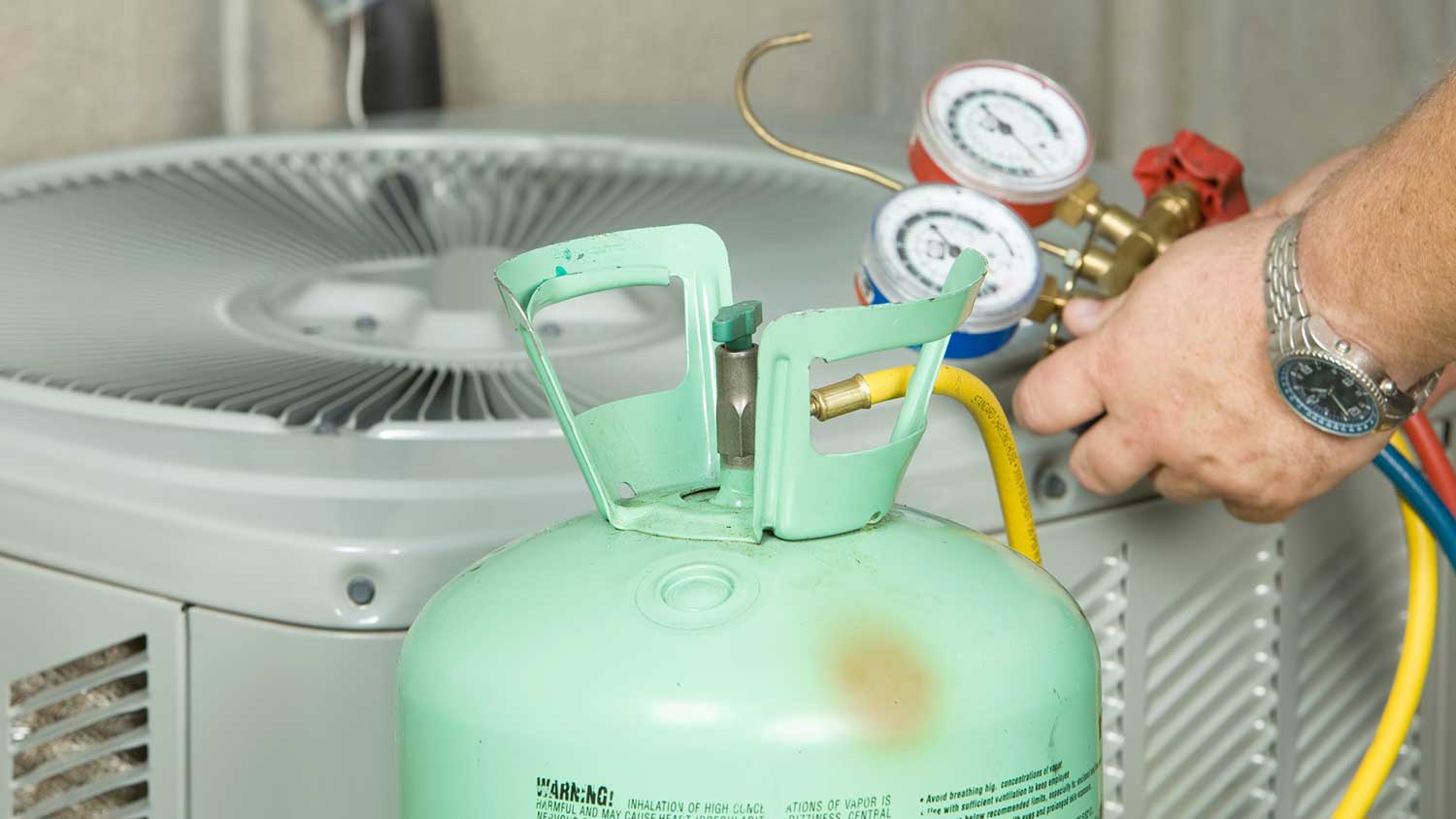How Much Does AC Freon Leak Repair Cost? [2025 Data]
On average, it costs $750 to repair an AC Freon leak, but many people pay between $250 and $1,600. A pro will evaluate the leak’s severity and other factors to provide a custom quote.


AC Freon leak repair costs between $150 on the low end and $2,000 on the high end, with most people paying around $750. The final price of the project depends on multiple factors, including the extent of the leak and the type and amount of refrigerant required.
Heads up: The term “Freon” is technically a brand name of refrigerant produced by DuPont. But over the years, it’s become synonymous with all types of AC refrigerant, so we’ll use both terms throughout this guide.
AC Freon Leak Repair Cost Factors
There are several variables that influence the cost of repairing a leaky air conditioner. Here are some of the main factors.
Leak Testing
Before fixing the leak, your HVAC technician will need to locate it. You can expect to pay $50 to $100 for a basic AC leak test. But if a more comprehensive test is required, it could cost several hundred dollars.
Type of Refrigerant

The type of refrigerant your AC unit uses will affect repair costs. If your system was installed before 2010, it may contain R-22, which costs $90 to $150 per pound. The Environmental Protection Agency (EPA) banned the production and importation of this refrigerant several years ago, which has driven up the cost of R-22.
Newer units use R-410A. At $50 to $90 per pound, it’s more affordable than R-22. However, the EPA is phasing out this refrigerant as well for a newer type, R-32, so the price of R-410A could increase as well.
| Refrigerant | Average Cost per Pound |
|---|---|
| R-22 | $90–$150 |
| R-410A | $50–$90 |
| R-32 | $10–$20 |
Severity of the Leak
The severity of the AC refrigerant leak will also impact how much it costs to repair. For example, if there’s a small leak coming from the evaporator coil, your HVAC professional may be able to patch it up instead of replacing the entire component. But if there’s major leaking or widespread damage, the pro may need to replace multiple parts, increasing the cost of the project.
Amount of Refrigerant Required

Similarly, the larger the leak, the more Freon you’ll need to add to your AC unit—and the pricier it will be. Most residential air conditioners range from 1 to 5 tons and require 2 to 4 pounds of refrigerant per ton. Based on those numbers, here’s how much it would cost to replace different amounts of R-410A refrigerant:
| HVAC Size (Tons) | Refrigerant (Pounds) | Average Cost (Labor and Materials) |
|---|---|---|
| 1 | 2–4 | $80–$300 |
| 2 | 4–8 | $160–$600 |
| 3 | 6–12 | $240–$900 |
| 4 | 8–16 | $320–$1,200 |
| 5 | 10–20 | $400–$1,500 |
Age and Condition of the AC Unit
It can be more difficult and time-consuming to find replacement parts for older AC units. As a result, it often costs more to fix leaks on dated air conditioners.
Labor
Labor represents a significant chunk of the cost to fix an AC leak. Prices vary by location, but HVAC professionals charge $100 to $250 for the initial service call, as well as $100 to $250 per hour for repairs.
Additional Repairs or Services
A Freon leak may indicate a larger problem with your air conditioner. If so, you may need to pay for additional repairs.
Replacing an AC evaporator coil costs: $600–$2,000
Replacing an AC condenser coil costs: $900–$2,800
Replacing an AC compressor costs: $800–$2,300
AC Repair vs. Replace
You might be wondering: Is it worth repairing a leaky air conditioner? Or would it be more cost-effective to replace the entire unit? The answer: It depends on a few factors, including the age of your system and the extent of the problem.
For instance, it makes more sense to repair your AC unit rather than replace it if it’s less than 10 years old and only has a minor leak. In cases like these, the air conditioner could still be under warranty, which could cover the cost of repairs.
However, there are other situations where you might consider installing a new AC unit. At $3,900 to $8,000, the cost of replacing an air conditioner is far higher than fixing a refrigerant leak. But if you have an older AC unit that uses R-22 refrigerant, replacing it may be more cost-effective than paying for pricey refrigerant and hard-to-find replacement parts. Similarly, if your air conditioner keeps breaking down or doesn’t run effectively, it might be time for an upgrade.
DIY AC Leak Repair vs. Hiring a Pro
Fixing an AC refrigerant leak isn’t a DIY-friendly project. In fact, EPA regulations state that only licensed professionals can legally handle and install Freon. If you suspect that your air conditioner is leaking refrigerant, contact an AC repair pro near you to diagnose and fix the problem.
Federal law prohibits the handling of refrigerant without a license. Ask your pro if they are “Section 608 certified,” which means they are trained and licensed by the EPA to recharge your air conditioner with refrigerant.
How to Save Money When Repairing an AC Freon Leak
Repairing a Freon leak requires a professional’s help, so you won’t be able to save money by doing it yourself. Still, you may be able to reduce costs by following these tips:
Don’t delay: Not only can ignoring a refrigerant leak be dangerous for your health, but it can also cost you more money in the long run. The longer you let refrigerant seep out of your air conditioner, the more you’ll need to replace. Plus, the leak could damage your unit and cause larger, more expensive AC problems.
Use your home warranty: Home warranties often cover HVAC repairs if they’re caused by normal wear and tear or age-related issues. However, there might be a limit on how much your provider will pay for a particular repair. Also, when submitting a claim, you may need to provide proof that you’ve been maintaining your HVAC system properly.
Get multiple quotes: Before hiring an AC repair company, shop around and request quotes from multiple providers. Compare each company’s pricing, online reviews, and ratings. Be wary of quotes that are much lower than the others because they could indicate that the contractor is inexperienced or cutting corners.
How Angi Gets Its Cost Data
Home is the most important place on earth, which is why Angi has helped more than 150 million homeowners transform their houses into homes they adore. To help homeowners with their next project, Angi provides readers with the most accurate cost data and upholds strict editorial standards. We extensively research project costs to develop the pricing data you see, so you can make the best decisions for you and your home. We rely on reputable sources, including the U.S. Bureau of Labor Statistics, academic journals, market studies, and interviews with industry experts—all to ensure our prices reflect real-world projects.
Want to help us improve our cost data? Send us a recent project quote to costquotes@angi.com. Quotes and personal information will not be shared publicly.
Frequently Asked Questions
No, you should not run an air conditioner with a Freon leak. If you think your AC unit is leaking refrigerant, shut it off immediately. When you keep using a leaky air conditioner, it could damage the unit and release more refrigerant. After turning off the AC, have an HVAC pro come take a look at the unit.
You might notice that your air conditioner isn’t running as effectively as it once did. Specifically, your AC unit could take longer to cool your home, or it might struggle to remove humidity from the air. Higher utility bills and hissing sounds coming out of your AC could also indicate a leak.
Freon circulates through your AC unit in a closed loop, so ideally, all of it should remain inside your system and never need to be replaced. However, if your AC starts leaking Freon (which is common), you’ll need to top it up. Known as an AC recharge, the cost of adding refrigerant to your air conditioner depends on the size and type of the AC unit, as well as the type of refrigerant.





- Furnace Repair
- Air Conditioning Repair
- HVAC Repairs
- Furnace Installation
- Wood & Pellet Stove Repair
- Dehumidifier & Humidifier Repair
- Heat Pump Companies
- Swamp Cooler Repair
- Wood Stove Services
- HVAC Companies
- Commercial A/C Repair
- Geothermal Installation
- Air Conditioning Installation
- Boiler Repair
- 24 Hour Furnace Repair
- Geothermal Repair
- Heat Pump Repair
- Humidifier Installation
- Thermostat Repair
- Thermostat Installation
- Nest Installation
- Heating & Cooling
- Heating Repair
- Furnace Cleaning
- Furnace Tune-Up
- HVAC Technicians
- Subcontractors
- Furnace Maintenance
- Plumbing & Heating Companies
- Wood Stove Inspection
- Mini Split Installation
- Wall Heater Repair
- Duct Installers











